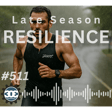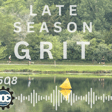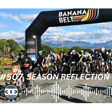
Vespa Power with Peter Defty
#489 Athlete Success with Vespa Power
Welcome
Welcome to Episode #489 of the 303 Endurance Podcast. We're your hosts Coaches Rich Soares and April Spilde. Thanks for joining us for another week of interviews, coaching tips and discussion.
If you have ever struggled with GI issues from too many gels, if you have every struggled to stay ahead of the bonk, if you feel blown up the day after a race - you want to listen to the rest of this episode. We have Peter Defty from Vespa Power joining us to give you some hope.
April, are you ready to talk about Vespa Power? And, are you ready to equip us with some resilience tools?
Heck yes, Rich! I am especially excited to share one resilience tool in our Get Gritty segment that has helped me and my athletes overcome personal challenges and setbacks. But first, let’s shift gears—literally and metabolically. If you’ve ever wondered whether there’s a better way to fuel your endurance engine, this is your wake-up call. Vespa Power might be the performance edge you’ve been missing. Let’s go!
Show Sponsor: UCAN
UCAN created LIVSTEADY as an alternative to sugar based nutrition products. LIVSTEADY was purposefully designed to work with your body, delivering long-lasting energy you can feel. Whether UCAN Energy Powders, Bars or Gels, LIVSTEADY's unique time-release profile allows your body to access energy consistently throughout the day, unlocking your natural ability to finish stronger and recover more quickly!
In Today's Show
-
Announcements and News
-
Interview: Peter Defty from Vespa Power
-
Get Gritty: The Setback Script
-
TriDot Workout of the Week: Race Rehearsal
-
Fun Segment: Coach Cari Lubenow / “That Pro Triathlon Life”
Announcements and News:
IRONMAN Press Release: Single One Day World Championship in Kona.
From Scott Derue
Dear Triathlon `Ohana,
-
Over the past year, the question I have been asked the most has been about the future of the IRONMAN World Championship.
-
For the first time in its history, the IRONMAN World Championship moved to split locations in 2023 for two reasons.
-
Significant numbers of deferrals from cancellations due to the COVID-19 pandemic required two days of racing, and a 2-day, single-location format was tried in 2022 and found to be unsustainable for the local community in Kona, Hawai`i.
-
With a deep commitment to and care for the Kona community, combined with the rich triathlon history and iconic sporting legacy of Nice, France, the decision was made to hold the men and women’s races in different locations.
-
In addition, aligned with IRONMAN’s goal of growing the sport of triathlon, it was expected that split locations for men and women’s racing would lead to greater exposure for all and more women participating in the sport of triathlon.
-
Since first announcing that format change, we have been meticulous in monitoring and reviewing athlete behavior, collecting feedback, and


















